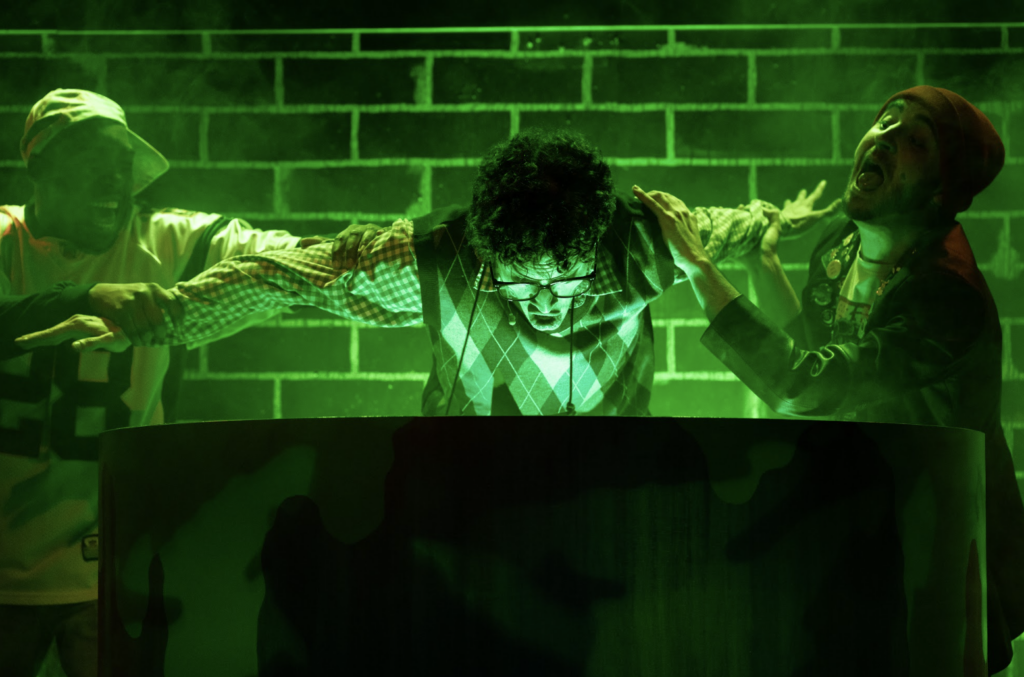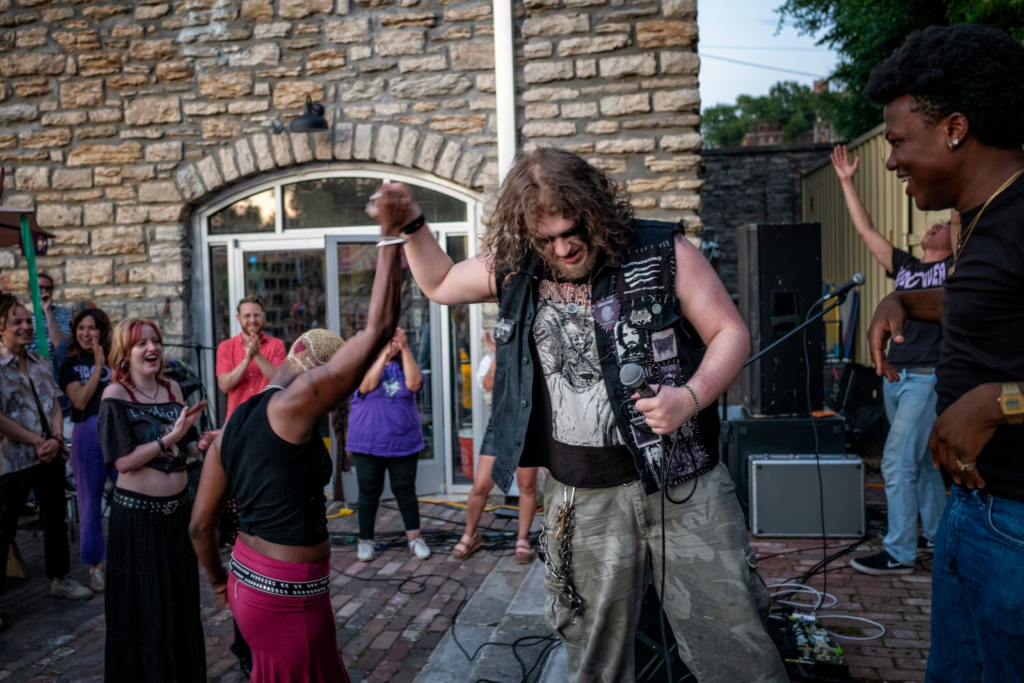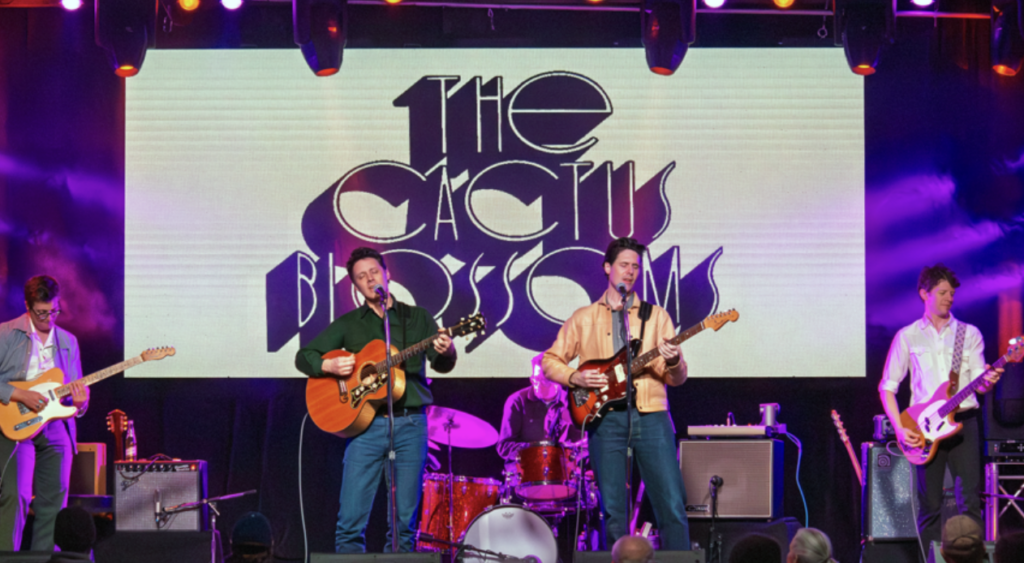Lene Lovich closes her first U.S. tour in decades at recordBar on Wednesday
When U.S. immigration hassles made it too difficult for Lene Lovich to bring her usual band members on tour, she found a solution just a few hours up I-35 in Des Moines, Iowa.
“We were not able to bring my British band, because the climate in immigration is very negative at the moment,” Lovich said in a phone call in between shows in Florida. “It was just too risky. We didn’t know if we’d have enough time to get the work permits – and even if we did have enough time, we really didn’t know if we would be allowed to come in. But the guitarist who works with my band, Jude Rawlins, came to America because he wanted to make films. He’s established here, and he’s got a family and his home is in Iowa. So he just said, ‘The easy solution is if I find musicians and we create a new band.’ And that’s what we’ve done. “
It’s a welcome return for the new-wave legend, currently wrapping up her first American tour since 1989. Born in Michigan and mostly raised in England, Lovich pursued a variety of creative avenues–appearing as a dancer in London cabaret clubs, playihg saxophone in various outfits, hanging with Salvador Dali, even co-writing tracks for French disco maven Cerrone–before joining the Stiff Records roster in 1978.
Her first two albums in particular, Stateless and Flex, combined top-notch songwriting with her distinctive alien croon. Lovich and her temporary band of Iowans have spent most of the fall alternating between their own club shows and opening for kindred spirits Devo and the B-52s.
Their tour closes in Kansas City on Wednesday, November 5 at recordBar.
We spoke to Lovich by phone to discuss her touring experiences, her early days on Stiff Records, and how she developed her sound.
The Pitch: You last recorded an album in 2005. What led up to you making a comeback now?
Lene Lovich: It’s totally down to being invited to join the B-52s and Devo. I don’t have a a record contract at the moment, and I don’t have a manager. I’m just here because they wanted me to be here. So that was just a unique opportunity for me. And we all know each other from a long time ago. So we fit very well together. I would just say we’re weirdly compatible, so it works well. It’s just amazing, the feeling that we have as a unit, both backstage and onstage.
Are you still recording or performing by yourself? You mentioned your British band.
We do a lot of live shows and play a lot in Europe and in the UK. We did a big tour in May. So we are together, but not in the same way. It’s not like it’s a career choice, it’s more of a life choice. We just do it because we want to do it. And that’s very powerful. We have a lot of energy and a lot of creative input to throw at the audience.
How have the audiences been?
Well, I still see that there’s a big mixture of people out there. That’s always been the case, even from years ago. I think the kind of music that I do is not necessarily fashionable–although maybe it was for a short while in the beginning, when I had a lot of publicity from record companies. But normally, my music appeals to all kinds of people for all kinds of reasons.
Accurately or not, you were kind of slotted in as punk or new wave, but I know you predate all that. What was your first impression when you first encountered that scene?
I was very, very excited because the music industry kept the doors tightly shut and only let certain people in. And the punk revolution in the UK was an amazing experience. Suddenly, the audiences were deciding what they wanted to hear, and this really confused a lot of the big record companies. So they had to open the doors, and so all kinds of people came in and it was so exciting. I can’t tell you really how wonderful it was. And thank goodness for me because I didn’t necessarily neatly fit into the stereotype punk band genre, but I was just one of the people who came in the door when the doors were open. So I’m really grateful to that punk revolution
What was it like being on Stiff Records? Were there any real characters in The Stiff stable that you remember?
Oh, well, in the early days it was just wonderful. just perfect. I thought they were the best record company in the world. They were just open-minded as to what kind of records to put out. And they were able to move quickly, which is something the big record companies couldn’t do. So there were no rules, really. All kinds of people were mixed up together, and we just were ourselves. We weren’t molded in any kind of way that the big music business people do. Every artist on Stiff was very unique, and there was strength in that
And we all went on tour together. All the newly signed people went on tour together. I wasn’t in the first wave of Stiff Records. It was really the second wave when they took on some new artists. We just learned from each other. Because, for example, I had never played on stage as a lead singer until I signed with Stiff. So it was all very new, and kind of scary and exciting at the same time. And I loved listening to the other more established artists like Wreckless Eric; I love the songs that he wrote, and i admired the strength in his songwriting. Everybody had some kind of unique um strength that I really admired. So I learned a lot in those early days at Stiff. I mean, after a while, they became a lot more like a regular record company, but in the early days, it was very exciting.
I know it’s going to seem strange, but everybody who was on that tour was part of my family, and it was like we were all the weird relatives, you know, that get lumped together at Christmastime. It was like we were all part of the family on this small record label. We were all recognized it was an event, and we were just happy to be there.
I didn’t know, actually, that you had never sung lead before you signed with Stiff. Had you been a singer beforehand?
Not really. I’d been in lots of other bands, um, but mainly playing a little bit of saxophone and singing backing vocals. I tried to play guitar for a short while, but it didn’t really suit me. I was in a sort of soul/reggae band and they let me play the rhythmic part of the reggae, like the upstroke bit. So I learned how to do that, but they made me stand at the back of the stage. They said the look of concentration on my face upset the audience. My guitar got stolen from the rehearsal room, o I decided to give it up and just stick with the saxophone. I am playing saxophone still after all these years because I have a natural attraction to it.
So when you took your place as the bandleader, did you immediately feel like, “Oh yeah, this is this is where I’m meant to be?” I’m always curious to know how people take to the spotlight.
Well, I think I’d been waiting a long time to have some kind of feeling of belonging somewhere. I struggled, you know, from a young age, really, and feeling very different from everybody else, just not fitting in. And I thought, oh, it’s never going to happen. But then suddenly it did, and I was very excited about that. It was people really liking me for who I am. I didn’t have to change the way I was; I didn’t have to try to mold myself to fit in. I mean, I had struggled all through going to art school being the odd one out. Suddenly I was accepted, and that was a lovely thing to feel. So, it just really felt like it fit right away and people responded well to it and you responded well to it. I mean, after a while, record companies did try to mold me into something that was more commercial, which was difficult for me. It was like a backward step.
How did you develop your vocal style? Are you trained? It doesn’t seem like Kate and Cindy are dissimilar in terms of unconventional voices.
I have no training, no conventional training. When I was at art school, I lived about half an hour’s walk from the school. I would just see how high I could go. After about a year, I could go really high. Then, coming home, I would see how low I could go., That really stretched my vocal range, even though I wasn’t really writing songs at the time. It was just something to do for fun.
I think we were just forced to create something with our voice. You didn’t have to have any equipment, you know; you just did it. You have to remember in the early days, synthesizers hadn’t really become an instrument. They were just starting to be used as special effects, but you couldn’t really “play” a synthesizer. If you had a sound in mind, you really had to do it vocally or find some other way of doing it. It’s very much a homemade thing. I haven’t really spoken to Kate or Cindy about that, but you know, it might be true for them. They might have felt like, Oh, I need that sound there, but it was not a conventional instrument sound.
With the really primitive synthesizer, you still had to be creative with the overall approach.
Yes, it wasn’t an instrument in those days. In fact, the first synthesizer that we had, you had to stick pins in a board to create the sound. There was no keyboard. There was like a joystick thing, and the pins in the board. And it was mainly for creating an explosion or some kind of weird frequency.
One of my favorite moments in your music is the break in “Lucky Number,” that robotic bit. How was that written?
My mind is just very free when I’m creating a song. I’m not a conventional musician; I have no expectations or rules. So when it came to a moment in the song where there might be a chorus, I didn’t have a chorus, so I just made a sound. In fact, Stiff Records had a problem with. They said ,”We don’t think ‘Lucky Number’ is a proper song, because it just has no chorus.” I said, “But there is a chorus. It’s the (recites the four notes). They didn’t quite get it. But it was a very popular song that we played live, so they put it out as a single.
Do you have a favorite song that you like to play live or that you’ve written?
It’s different songs for different occasions. There are some songs I really like doing, but I wouldn’t do them because the occasion isn’t right. For example, on the big shows that we do with Devo and B-52s, we’re only allowed to play six songs, because we are the opening band. So within six songs, In fact, it was seven, but they told us we had to cut one song. So I couldn’t do something like “Bird Song” or maybe some of the other longer songs. So really, it depends on the feeling at the time of what’s appropriate. There are songs that I’m more emotionally attached to. For example, “Bird Song” or “Home.” We always do “Home.”
You mentioned looking for a family and, you know, feeling like a misfit. “Home” seems to fit right into that.
Well, yes. I had people coming to the shows and saying that that is their favorite song, because it says something about family life that you don’t hear in other songs. So it’s a strong feeling and it’s quite emotional.
Lene Lovich plays RecordBar on Wednesday, November 5. Details on that show here.






